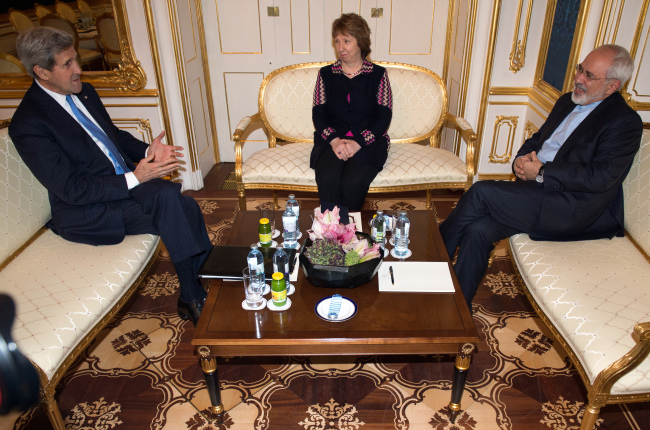Iran, world powers seek elusive deal
Negotiators face struggle to break deadlock in nuke talks on eve of deadline
By Korea HeraldPublished : Nov. 23, 2014 - 21:15
VIENNA (AFP) ― Iran and world powers face an uphill struggle Sunday to break the deadlock in their high-stakes nuclear negotiations and secure a historic deal on the eve of a deadline.
“We’re working hard,” U.S. Secretary of State John Kerry said Saturday in Vienna, “and we hope we’re making careful progress, but we have big gaps, we still have some serious gaps, which we’re working to close.”
Kerry, who on Friday postponed a trip to Paris to remain in Vienna for the talks, met Iranian Foreign Minister Mohammad Javad Zarif on Saturday afternoon, their fourth meeting in three days.
German Foreign Minister Frank-Walter Steinmeier, also in the Austrian capital, called this final weekend of talks, after months of negotiations, a “moment of truth.”
At stake is a historic deal in which Iran would curb its disputed nuclear activities in exchange for broad relief from years of heavy international economic sanctions.
It could end a 12-year standoff that has even raised the prospect of Israeli military strikes on Iranian nuclear facilities.
Kerry spoke to Israel’s Prime Minister Benjamin Netanyahu on Saturday by phone.
“The gap remains big ... There now needs to be a political decision,” an Iranian source said on condition of anonymity, putting the onus on the world powers to make concessions.
“We’re working hard,” U.S. Secretary of State John Kerry said Saturday in Vienna, “and we hope we’re making careful progress, but we have big gaps, we still have some serious gaps, which we’re working to close.”
Kerry, who on Friday postponed a trip to Paris to remain in Vienna for the talks, met Iranian Foreign Minister Mohammad Javad Zarif on Saturday afternoon, their fourth meeting in three days.
German Foreign Minister Frank-Walter Steinmeier, also in the Austrian capital, called this final weekend of talks, after months of negotiations, a “moment of truth.”
At stake is a historic deal in which Iran would curb its disputed nuclear activities in exchange for broad relief from years of heavy international economic sanctions.
It could end a 12-year standoff that has even raised the prospect of Israeli military strikes on Iranian nuclear facilities.
Kerry spoke to Israel’s Prime Minister Benjamin Netanyahu on Saturday by phone.
“The gap remains big ... There now needs to be a political decision,” an Iranian source said on condition of anonymity, putting the onus on the world powers to make concessions.

The Iranian negotiators were hailed by officials in Tehran for respecting their country’s “red lines.”
A European source in the talks said there had been “no significant progress” and “the chances of getting a deal are pretty reduced.”
“In order to get a deal the Iranians will have to budge in a rather substantial manner,” he said. Discussions about a deadline extension could begin as early as Sunday, he added.
Many experts believe that the deadline may be extended, as happened with an earlier cut-off point on July 20, but officials insist that this is not on the table ― yet.
However, a senior U.S. official said late Saturday that the aim remained getting a deal by Monday night “but we are discussing both internally and with our partners a range of options.”
The United States, Russia, China, Britain, France and Germany have been locked in talks with Iran since February to turn an interim accord reached a year ago into a lasting agreement by Nov. 24.
Such a deal is aimed at easing fears that Tehran will develop nuclear weapons under the guise of its civilian activities.
The Islamic Republic hotly denies such an aim and insists its program is entirely peaceful.
British Foreign Secretary Philip Hammond and his French counterpart Laurent Fabius also joined the talks on Friday. Both have since left but were expected to return.
It was unclear when or whether Russian Foreign Minister Sergei Lavrov, a key player in the talks, might arrive.
Earlier this week the head of the Russian delegation said Lavrov would come only if there was serious progress.
Lavrov said from Moscow on Friday that “all the elements are already on the table” for a deal and that all that was missing was the “political will.”
Kerry has “updated” Lavrov by phone, and also talked with the foreign ministers of several Gulf states as well as Turkey and Canada, aides said.
Some areas under discussion appear provisionally settled in what would be a highly complex deal that would run for many years, even decades.
But two key issues remain: the enrichment process that renders uranium suitable for peaceful uses but also at high purities for a weapon; and the pace of the lifting of sanctions against Iran.
Tehran wants to massively ramp up the number of enrichment centrifuges ― in order, it says, to make fuel for a fleet of future reactors ― while the West wants them dramatically reduced.
“The remaining issues are tough and an agreement will require difficult political concessions from both sides,” Arms Control Association analyst Kelsey Davenport said.
“Even though progress is slow, it is movement in the right direction. The parties may not get there by midnight on Monday, and a short extension may be required to make it over the final hurdles,” she said.
“But a good deal is more important than a deadline. Neither side can afford for talks to fail.”
-
Articles by Korea Herald


![[AtoZ into Korean mind] Humor in Korea: Navigating the line between what's funny and not](http://res.heraldm.com/phpwas/restmb_idxmake.php?idx=644&simg=/content/image/2024/04/22/20240422050642_0.jpg&u=)

![[Exclusive] Korean military set to ban iPhones over 'security' concerns](http://res.heraldm.com/phpwas/restmb_idxmake.php?idx=644&simg=/content/image/2024/04/23/20240423050599_0.jpg&u=20240423183955)

![[Herald Interview] Why Toss invited hackers to penetrate its system](http://res.heraldm.com/phpwas/restmb_idxmake.php?idx=644&simg=/content/image/2024/04/22/20240422050569_0.jpg&u=20240422150649)
![[Graphic News] 77% of young Koreans still financially dependent](http://res.heraldm.com/phpwas/restmb_idxmake.php?idx=644&simg=/content/image/2024/04/22/20240422050762_0.gif&u=)







![[Exclusive] Korean military to ban iPhones over security issues](http://res.heraldm.com/phpwas/restmb_idxmake.php?idx=652&simg=/content/image/2024/04/23/20240423050599_0.jpg&u=20240423183955)



![[Today’s K-pop] Ateez confirms US tour details](http://res.heraldm.com/phpwas/restmb_idxmake.php?idx=642&simg=/content/image/2024/04/23/20240423050700_0.jpg&u=)